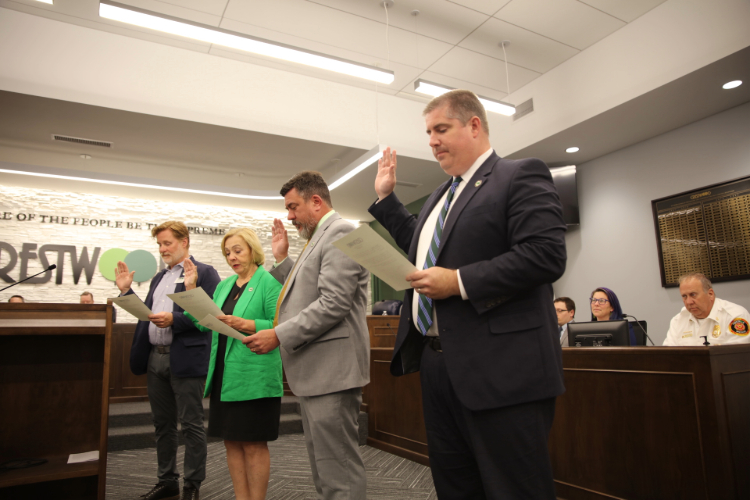Lindbergh Schools officials are pleased the U.S. Department of Education recently approved the state’s request for a waiver from requirements of the federal No Child Left Behind Act.
The U.S. Department of Education last month approved Missouri’s Elementary and Secondary Education Act waiver, giving the state flexibility from the No Child Left Behind requirements.
In February, the State Board of Education gave its approval for the Missouri Department of Elementary and Secondary Education, or DESE, to seek the waiver.
DESE officials say approval of the waiver will allow Missouri to use its own accountability system to: more effectively identify struggling schools, efficiently direct resources to struggling schools and recognize schools achieving exemplary results.
At a recent Board of Education meeting, President Vic Lenz noted the state’s request for the NCLB waiver had been approved and said, “ It’s a very positive thing that that has happened ”
Assistant Superintendent for Curriculum and Instruction Nancy Rathjen said, “We’re all very excited about that ”
The federal NCLB Act was adopted in 2001 with the goal of having all students achieve the proficient level on state tests by the 2013-2014 school year.
NCLB requires all districts and schools receiving Title I funds to meet state “adequate yearly progress,” or AYP, goals for their total student populations and for specified demographic subgroups, including major ethnic/racial groups, economically disadvantaged students, limited English proficient students and students with disabilities.
If schools fail to meet AYP goals for two or more years, they are classified as schools “in need of improvement” and face a variety consequences, including being required to offer student transfers, corrective action and restructuring.
As such, Superintendent Jim Simpson told the Call he also is pleased the waiver request was approved.
“We are happy that there’s movement on No Child Left Behind because No Child Left Behind as a legislative law is recognized as full of flaws, and we’ve all known that,” he said. “That every child is going to be proficient by 2014 — that sentence alone tells you that there’s some pie-in-the-sky things going on there.
“But Congress — every congressional member recognizes that. So there’s not even a true opposition to modifying the law and making it more sensible and sane. But they’ve been very busy with other things. This is way down their list,” he added.
Because education, specifically NCLB, has not been a high-priority issue for Congress, that is why the option to seek a waiver became available, according to Simpson.
“ Every time they think about moving education to the front burner and modifying the No Child Left Behind law, they say, ‘Well, there’s other, more pressing issues.’ So they came up with a waiver, which is, in a way, a modification of No Child Left Behind,” he said. “ I think everyone in the whole nation probably that’s involved in education and maybe even politics would say, ‘There needs to be adjustments to No Child Left Behind.’
“So we’re happy that the state of Missouri’s been granted a waiver,” Simpson continued. “By that word, it sounds almost like you don’t have to do anything concerning No Child Left Behind. No, it just modifies and adjusts it ”
Even with the waiver, “heavy accountability” remains in place.
“ We’re still going to take accountability tests — state- and federal-mandated accountability tests every spring,” he said. “We’re still going to be held accountable. As a matter of fact, accountability is probably a little higher under the waiver than it is under No Child Left Behind because there’s been some preliminary analysis that says (under) the new MSIP (Missouri School Improvement Program) 5 standards, which helped get our waiver, the number of schools districts that are going provisional or unaccredited could double.”
The MSIP 5 standards will go into effect for the 2014-2015 school year and Missouri Assessment Program, or MAP, tests no longer will be given to students.
“There is no further MAP in ’14-’15. That’s over,” Simpson said.
A resolution adopted last month by the State Board of Education outlines its support for the MSIP 5 scoring guide.
The resolution noted the MSIP 5 standards were formulated after DESE “actively sought and received input for over two years from parents, students, teachers, administrators, education-related organizations and legislators in the refining of performance measures ”
The goals of MSIP 5, according to the resolution, “are to promote continuous improvement and innovation in Missouri public schools, establish the state’s expectations and to distinguish performance of schools and districts ”
The MSIP 5 test that replaces the MAP test will be “a national test,” Simpson said. “So for the first time, states will be on a level playing field, which I actually like. Under No Child Left Behind, one of the flaws was that every state could define their own proficiency So we had some states that were rigging the game. They were defining proficient so low that they could brag, ‘Look at us. We have so many more students proficient than Missouri.’
“Well, their test was three times easier. Missouri, being Missouri, they went for, ‘Let’s have a very difficult and rigorous test because we’re really focused on making sure students are successful and have the skills that they need.’ So we’re sort of already primed for the national test. We’ll do well on it because we’re already in great shape in terms of understanding how to instruct students and get them the skills that they need to achieve well on their tests ”
In a separate matter at the July 10 board meeting, Simpson noted Lenz recently completed a one-year term as president of the Missouri School Boards’ Association, or MSBA, and announced Lenz has been appointed secretary-treasurer of the Cooperating School Districts Board of Directors.
“ Dr. Vic Lenz is now an officer on their board. So that’s good for Lindbergh and good for them ,” Simpson told the Board of Education. “This (is) on top of the great experience he’s had as the president of MSBA.
“So, he brings a lot to CSD, and we’re very proud of him and what he’s doing there ,” the superintendent added.






















